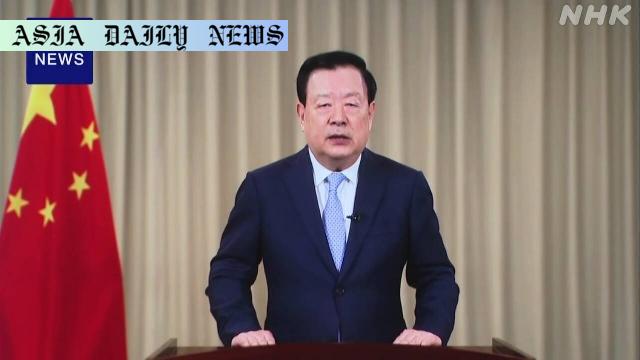National Interest: Chinese senior official opposes HK firm’s sale of Panama port assets involving a U.S. investment fund.
- National Interest: China’s top official opposes the sale of a Panama Canal-based port by a Hong Kong conglomerate to U.S. investors.
- Xia Baolong, a senior official, warned against siding with external forces, calling it a betrayal of national interest.
- The port sale has been delayed amid political and economic tensions between China and the United States.

Introduction
In a strong and direct message, Xia Baolong, Director of the Hong Kong and Macao Affairs Office, voiced his concerns about a Hong Kong-based conglomerate’s potential decision to sell its port operations near the Panama Canal to a consortium including a U.S. investment fund. This move signals growing unease in Beijing over China’s strategic assets and relations with Hong Kong amidst escalating tensions with the United States.
Backdrop of the Port Sale Controversy
The Panama Canal, a pivotal international shipping route, holds immense geopolitical significance. CK Hutchison Holdings, which operates several global ports, announced plans to sell its Panama-based assets to a U.S.-led group. The deal, initially set to conclude by April 2, has faced scrutiny and mounting pressure from the Chinese government. Concerns range from national security to the broader implications of foreign influence at such a crucial infrastructure point.
China’s Response and Growing Concerns
Xia Baolong’s remarks reflect growing Chinese apprehension about external interference and the imperative of safeguarding strategic interests. In his statement, Xia emphasized the significance of loyalty to national interests, criticizing any allegiance to forces perceived as adversarial, particularly the U.S. He implied that such actions would not only violate China’s national interests but also have historical repercussions, signaling Beijing’s stern stance against decisions that might compromise its position on global fronts.
Geopolitical Implications of the Panama Canal Port
The Panama Canal, a cornerstone in international trade, represents not just economic, but also strategic military value. As geopolitical rivalries between the U.S. and China intensify, control over such assets becomes emblematic of global dominance. China’s Belt and Road Initiative further underscores its ambitions to leverage global infrastructure for economic soft power. In this context, the potential sale of the port to a U.S.-linked group is viewed as a step that could weaken China’s geopolitical hold.
Patriotism Versus Globalization
Amidst global trade intricacies, Xia’s comments shed light on a broader dilemma faced by Hong Kong’s businesses — balancing globalization with national loyalty. Companies are now expected to demonstrate patriotism, aligning their decisions with broader national directives. This move could restrict their operational autonomy, compelling them to navigate a challenging landscape of political and economic expectations.
Trade Tensions Between China and the U.S.
The strained relations between these global superpowers continue to influence business decisions and international alliances. The Trump administration, and to a degree subsequent administrations, have raised concerns over China’s growing influence in critical infrastructures globally. Conversely, Beijing views these concerns as unfounded attempts to curb its growth, leading to an ongoing tug-of-war over influence, especially in strategic locations like the Panama Canal.
Conclusion: A Crossroads for Hong Kong Businesses
The unfolding situation surrounding CK Hutchison’s port sale underscores the broader challenges faced by Hong Kong’s conglomerates. As key players in the global economy, they find themselves at a crucial juncture, navigating between the push for globalization and demands for national allegiance. The outcome of these deliberations will not just impact business decisions but also play a significant role in defining China’s evolving geopolitical maneuvering and its relations with the world.



Commentary
Geopolitics: The Delicate Balancing Act
The unfolding situation highlights the intricate relationship between geopolitics and business decisions. For CK Hutchison Holdings, the sale of its port operation near the Panama Canal is not merely a commercial transaction; it carries significant geopolitical undercurrents. On one hand, there is the potential for financial gains and fostering global business ties, while on the other, there is an undeniable pressure to prioritize national loyalty and strategic interests. This raises important questions about the autonomy of businesses in politically charged environments.
The Impact of U.S.-China Rivalry
The rivalry between the United States and China extends beyond trade wars and tariffs to control over critical infrastructure and global influence. The Panama Canal, given its economic and military relevance, has become a symbol of this larger power struggle. As the two superpowers vie for dominance, businesses like CK Hutchison find themselves caught in the crossfire, forced to navigate complex decisions that align with one power without antagonizing the other. This dynamic illustrates the far-reaching implications of global geopolitics on individual enterprises.
National Interest Versus Global Business
Xia Baolong’s remarks underline the growing expectation for businesses to align with national interests, particularly at times of heightened political tension. While it is understandable for a nation to safeguard its strategic assets, the insistence on unwavering loyalty can stifle the very globalization that has benefited economies like Hong Kong’s. In an increasingly interconnected world, finding a balance between protecting national interests and fostering global cooperation is critical to ensuring sustainable economic growth.
The Way Forward
The CK Hutchison case serves as a timely reminder of the complexities facing businesses that operate at the intersection of commerce and geopolitics. Going forward, it will be essential for companies to tread carefully, leveraging diplomatic channels and sound decision-making to avoid fallout. This incident also calls for dialogue between governments and enterprises to collaboratively address such tensions and foster environments that promote both national and global economic interests.